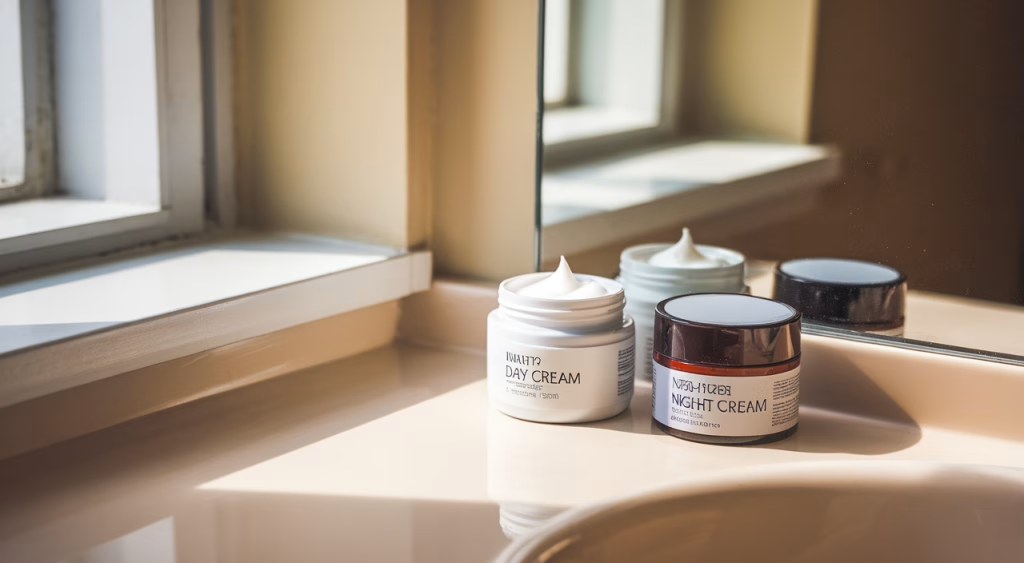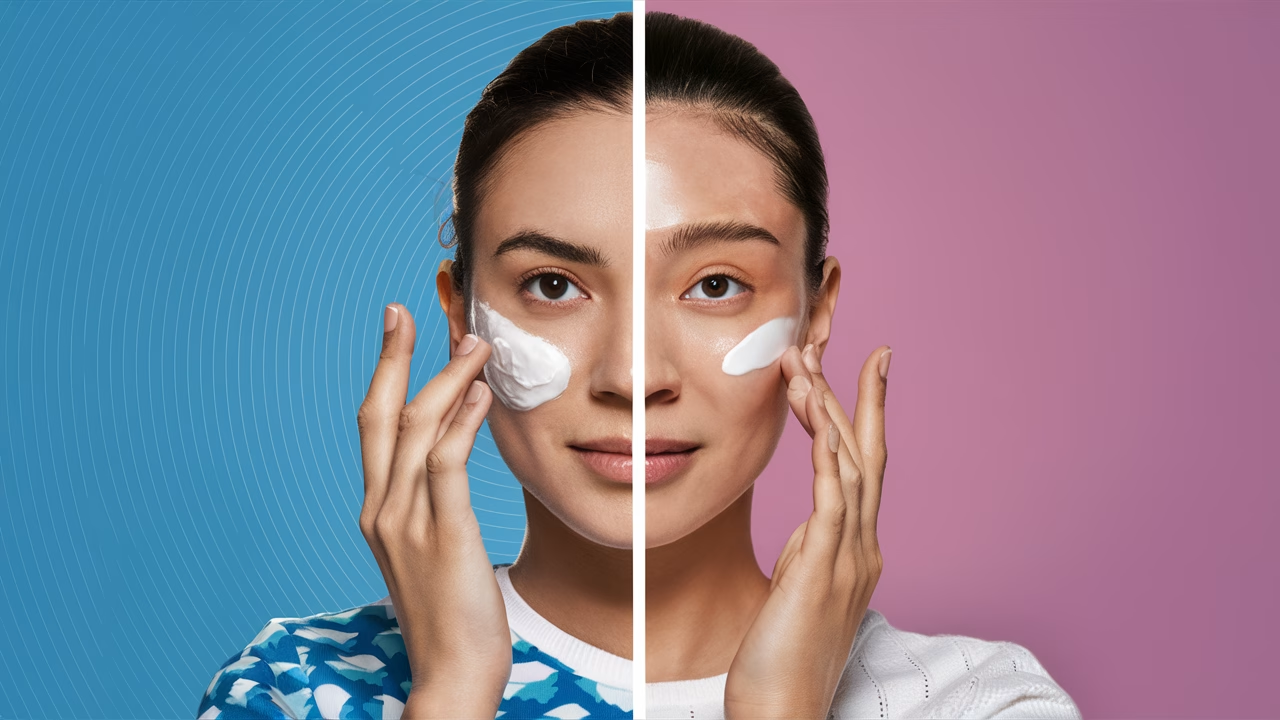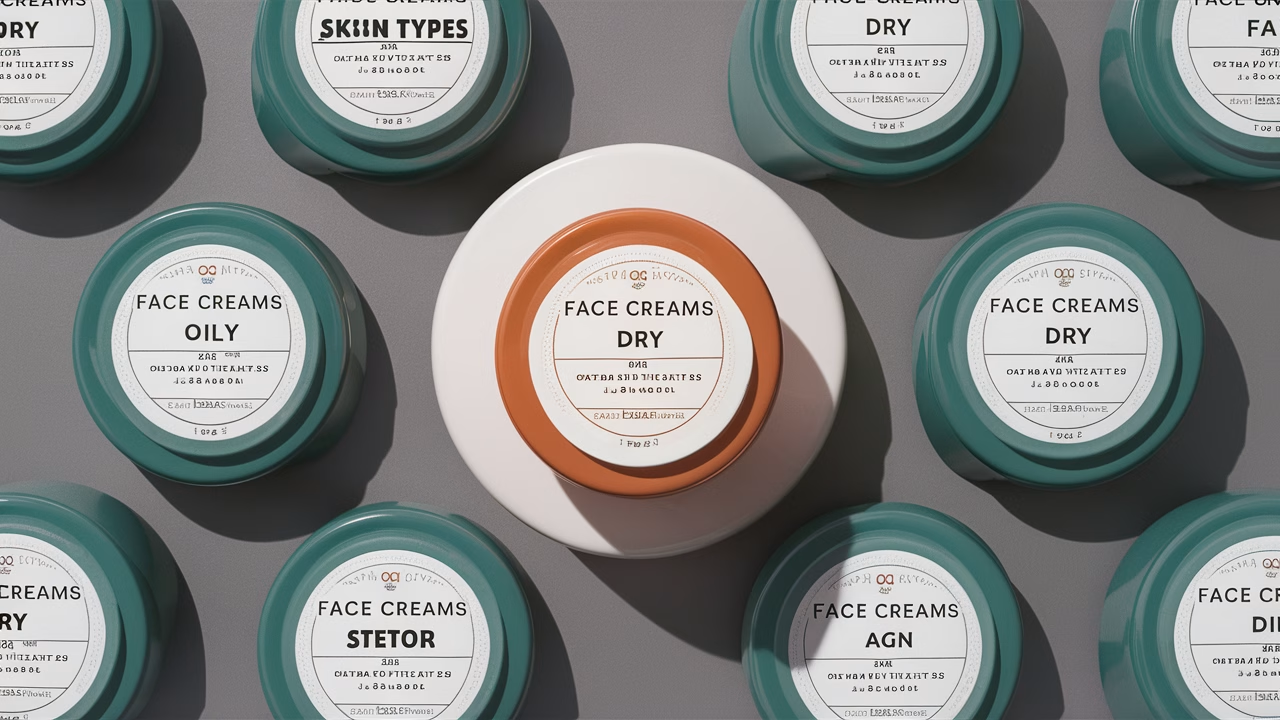What’s the Real Difference Between Moisturizer and Day and Night Cream?
The true difference between day and night creams lies in the timing, formulation, and purpose. Day creams are formulated to protect and hydrate your skin during the day, while night creams are designed to repair and nourish your skin as you sleep. Understanding this difference between moisturizer and day and night cream helps you choose products that work with your skin’s natural cycles.
TL;DR Summary
- Day creams are lightweight, often include SPF, antioxidants, and are ideal for layering under makeup in your morning skincare routine.
- Night creams are thicker, heavier, and focus on repair, often loaded with peptides, retinoids, or ceramides for overnight rejuvenation.
- The difference comes down to ingredients, texture, and the skin’s needs during different times of the day.
- Choose based on your skin type: Oily skin benefits from gel-based moisture; dry skin thrives on heavier night formulas; aging skin requires retinol and peptides.
- Real-life usage scenarios: Use light lotion before work, switch to nourishing cream before bed for visible improvements.
Understanding the Difference: Moisturizers vs. Day and Night Creams
You’ve probably heard the terms tossed around the beauty aisle: moisturizer, day cream, night cream. But what really sets them apart? Think of it like choosing outfits for different events. You wouldn’t wear a cocktail dress to a yoga class, right? Similarly, your skin doesn’t have the same needs at 8 AM as it does at midnight.
Day Cream: Typically infused with protective ingredients like antioxidants and SPF, day creams are your skin’s bodyguard. They work behind the scenes to battle pollution, UV rays, and environmental aggressors while keeping your skin looking fresh and hydrated during your morning routine.
Night Cream: While you sleep, your skin shifts from protect mode to repair mode. Night creams are richer and thicker because that’s when your skin is most receptive to nourishment. They usually contain powerhouse ingredients like hyaluronic acid, retinol, or peptides to aid cell regeneration. The heavier texture allows these ingredients to penetrate deeper without interference.
General Moisturizer: This is a broader term. A basic moisturizer may or may not be tagged specifically for day or night use. Think of it as a multitasker but without the targeted benefits of time-specific creams.
Common Ingredients in Each
| Type | Key Ingredients | Main Function |
|---|---|---|
| Day Cream | SPF, Vitamin C, Niacinamide, Antioxidants | Protect and prevent damage |
| Night Cream | Retinol, Hyaluronic Acid, Ceramides, Peptides | Replenish, repair, renew |
| General Moisturizer | Glycerin, Dimethicone, Natural Oils | Hydration and barrier support |
Benefits of Using a Day Cream in Your Morning Skincare Routine
Morning skincare is all about defense. Day creams are crafted to act like that invisible shield your skin wears while tackling workdays, school runs, or city pollution. The magic lies in the formulation, and many companies now focus on creating lightweight yet protective formulas. Here’s why these products deserve a firm spot in your morning routine:
- Antioxidants: To fight oxidative stress caused by UV light and pollution.
- SPF: Some day creams include sun protection, reducing the need for extra layering.
- Lightweight Texture: So they don’t clog pores or mess with your makeup.
- Hydration: Keeps skin supple and balanced throughout the day.
Imagine starting your day with skin that feels refreshed, protected, and ready to glow—all because you chose the right formulation for your morning skincare routine.
Night Creams Unveiled: Why Thicker and Heavier is Better
Night creams are like silent heroes—the rich, emollient finish many of us associate with nighttime pampering isn’t just about luxury, it’s about science. Here’s how they work and why thicker and heavier formulations are smarter at night:
- Deep Repair: Overnight creams typically contain actives like retinol that boost cell turnover while you sleep.
- Intense Hydration: Skin’s natural barrier repairs more efficiently with ingredients like shea butter, fatty acids, and ceramides.
- Non-interference Window: You’re not sweating, touching your face, or wearing makeup, so night creams stay on longer and work more effectively.
These thicker creams are your overnight couriers—packing moisture and nutrients into skin that does its best healing after hours. The heavier texture isn’t a drawback; it’s a strategic advantage for nighttime repair.
Factors to Consider in Choosing the Perfect Day and Night Cream
Let’s put theory into practice. Understanding the difference between moisturizer and day and night cream helps you tailor your selection based on real skin types, concerns, and preferences.
Choosing by Skin Type
| Skin Type | Day Cream Traits | Night Cream Traits |
|---|---|---|
| Oily | Gel-based, oil-free, mattifying | Light weight, non-comedogenic |
| Dry | Hydrating with humectants | Thicker, occlusive-rich |
| Combination | Balancing, lightweight oils | Creamy but not greasy |
| Aging | Includes antioxidants, SPF | Includes retinol, peptides |
Ask yourself: Does your skin feel parched by midday or extra oily in the morning? This self-awareness allows you to adjust your regimen and choose wisely between different moisturizer and day and night cream options.
Skincare Routine Tips for Maximum Benefits
The order and consistency of your routine are just as important as which product you use. Here’s a basic layout that works for most skin types and won’t overwhelm even beginners looking to understand the difference between products.
Morning Routine
- Cleanser
- Toner (if using)
- Serum (Vitamin C or hydrating)
- Day cream with SPF
- Makeup or sunblock (if not in cream)
Night Routine
- Cleanser to remove makeup and dirt
- Toner (optional)
- Serum (like AHA or retinol—never both)
- Night cream to seal the deal
Real-life tip? Don’t overdo it. More product doesn’t equal better results. Stick with the basics and build gradually as you learn what works for your skin.
Cost Guide: What to Expect in Singapore
| Product Tier | Price Range (SGD) |
|---|---|
| Low-End | $8–$25 |
| Mid-Range | $30–$60 |
| High-End | $70–$200+ |
Be a mindful shopper. A higher price doesn’t always ensure compatibility with your skin type. Test and trial where possible, and remember that many companies offer samples to help you understand which formulation works best.
Frequently Asked Questions
- When should I apply moisturizer in my skincare routine?
Apply moisturizer as the final step after toner and serums to lock everything in. - Can I use my night cream during the day?
Technically yes, but night creams are heavier and may not sit well under makeup or offer sun protection. - Is there a difference between face moisturizer and night cream?
Yes. Face moisturizers are meant for general hydration, whereas night creams are enriched with reparative ingredients. - What’s the best morning skincare product for glowing skin?
A lightweight day cream with Vitamin C and SPF helps create that radiant glow while protecting your skin. - Should oily skin types use night cream?
Absolutely. Look for non-comedogenic formulas with lightweight hydration and calming ingredients. - Can heavy night creams cause breakouts?
Only if the formula is occlusive and contains pore-clogging ingredients. Check labels for suitability. - How long before I see results?
Typically within 2–4 weeks for hydration changes, longer for anti-aging benefits.


